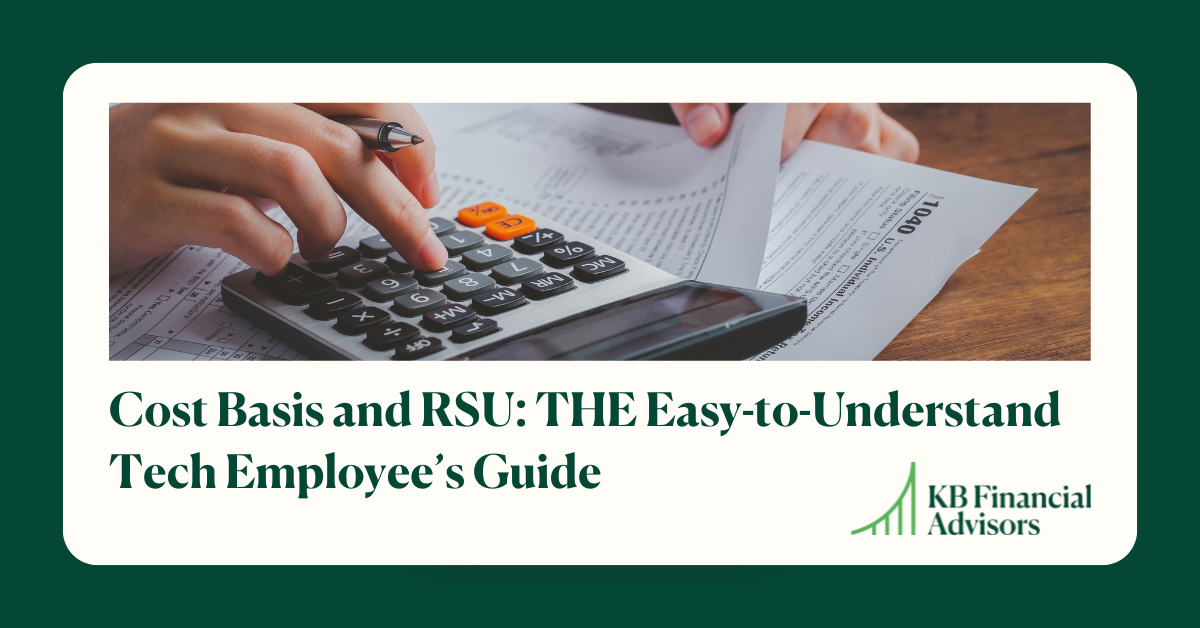When you’ve got stock in a company, it’s normally a really, really good thing.
Especially RSUs (or restricted stock units). They’re stock you get just by working in a company…. Ones you don’t even have to pay for.
And any time those RSU shares “vest”—meaning the company hands ownership of them over to you—you become a wealthier individual.
Cha-ching! ????
But then… of course… as is with any form of “income,” the IRS wants their share too.
That’s where understanding your RSU cost basis becomes important. Since RSUs are gifted (not purchased), the IRS uses the fair market value at vesting to determine how much they’re worth… so they can calculate the tax you owe.
(Sometimes it’s also called tax basis… because it’s what’s used to figure out taxes.)
In most cases, your RSU cost basis is the market price of the stock on the day your shares vest.

How RSUs Are Normally Granted
In most RSU agreements, you get a grant of RSUs expressed as a set dollar amount.
So if your company grants you a $400,000 total value and the shares of your company are worth $10 each at the time of grant, that means you’re granted 40,000 shares.
But, you probably have a vesting schedule divided up over the course of four years, which means you get 10,000 shares per year. (Or a $100,000 value each year.)
RSU Cost Basis: Why Your Vested Shares Cost You Money at Tax Time
However, since your vested RSUs are granted to you and you don’t have to pay for them, they’re considered taxable income when they vest, rather than an investment expense.
So, if you vested 10,000 shares at $10 each, that’s $100,000 of value you received, which means that money will be taxed like ordinary income, just like your salary and your bonuses.
And this is really important to keep in mind, because most likely, your company won’t withhold enough to cover the extra amount you’ll owe in taxes. (Typically, for example, tech companies sell enough shares to withhold 22% for federal taxes and 10% for state taxes. However, many tech employees are in a higher federal tax bracket than 22%, meaning you’d owe more than what your company withheld… and you’ll have to pay it out of your pocket.)
Translation? You’ll likely need to pay extra taxes out of pocket when April rolls around.
Update: RSU Withholding in 2024
Many companies have recognized that the standard Federal withholding of 22% is creating a real problem for their employees with RSU. If your company allows it, you may be able to choose a higher supplemental wage withholding rate to avoid a large tax bill next April.
Speak with your financial advisor… we often recommend our clients elect a higher voluntary withholding rate on their RSUs when possible.
Future Taxes on Vested RSUs (Why Cost Basis is So Important)
Now that your vested shares officially belong to you, the RSU cost basis (or market price on the day of vesting) determines the taxes you’ll owe on them in the future.
So, if the price of the shares goes up, the difference between the cost basis and the current increased price will be considered a capital gain, and that’s what you’ll be taxed on when you sell the shares. (However, if you hold onto these without selling for more than a year, the gain is taxed at a long-term capital gains rate, which is lower than ordinary income taxes.)
But, if the price goes down, you’ll have a capital loss (even if you didn’t pay for the shares in the first place). And if you’re registering a capital loss with these shares, they can be used to offset your capital gains in other investments…. Or reduce your ordinary, taxable income by up to $3,000 per year.
Do You Ever Need to Adjust Your Cost Basis?
The short answer: no.
But read on… missing or unreported RSU cost basis can still be a big issue.
Sometimes people get confused about this, because there are so many moving parts to taxes, especially when you’re talking about RSU and income tax and shares and capital gains…
But no, you should never need to adjust your cost basis for RSU shares. (Unless we’re talking about Alternative Minimum Tax, and that’s a separate conversation.)
Your cost basis is simply the market price of your company’s shares on the day they vested in your name… and that figure doesn’t change. And since that piece of information will never change, you’ll never need to adjust your cost basis for regular tax calculations.
But one thing you should watch out for when filing your taxes is if your cost basis isn’t reported, or if there’s a missing cost basis anywhere. It’s more common than you think, so make sure you’re careful.
Before filing, double-check your W-2 income from RSUs matches the cost basis listed on Form 1099-B.
If it doesn’t or if you miss reporting the form altogether, you may receive an IRS CP2000 notice, saying you owe them more money. (It sounds scary, but it’s usually solvable.)
^ Click to reserve a free consultation. ^
Double-Trigger RSUs During an IPO & Cost Basis
Double-trigger RSUs during an IPO are particularly interesting when it comes to cost basis, though.
The reason is, these shares “vest” over time but don’t become yours until a liquidity event happens… like an IPO.
So, if you get 10,000 shares per year, but work for the company for three years before an IPO happens, that’s 30,000 shares potentially vesting all at once. ???? Yeah. Talk about a tax bill.
The thing is, these shares might vest immediately on the IPO date, or they may happen at a later date… check your RSU Grant Agreement to figure out when this is. (Knowing it will help you predict cost basis and plan your tax strategy for April.)
If there’s nothing there, you may get an email once the IPO is announced to let you know when it will happen, so you can have a better idea of what the cost basis of these shares will be.
Regardless of timing, the cost basis is always the market price of the shares on the exact date they vest.
Making RSU and Cost Basis Easy to Manage… And Selling for Profit
Knowing that the cost basis of each RSU vesting event never changes can help simplify your recordkeeping.
But since most people will have multiple vest dates for their RSUs, that can be something that gets confusing when it comes time to file your taxes… especially if you’ve had more than one set of shares vest to you under your RSU agreement.
Plus, there’s all the calculations to do about keeping or selling your shares… and whether they’re calculated as normal income or as long-term capital gains.
If you’re unsure how to manage your RSU taxes, whether to hold or sell, or how to plan around capital gains… we can help.
Get in touch for a consultation with one of our IPO and stock tax experts. We’ll help you make the most of your equity while staying on top of your tax obligations.



